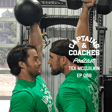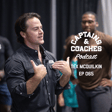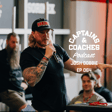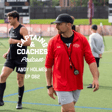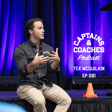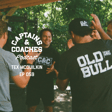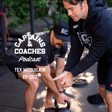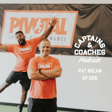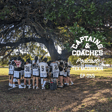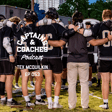Dealing with Negativity Bias and Physiology
00:00:00
Speaker
the traps of being a human of like negativity bias and some of like the poor physiology that comes with all this, that impedes high performance. If you can deal with the human and have some grit and grace with the human, you can eventually apply some of my bullshit, the breathing, the sauna, the ice, the,
00:00:15
Speaker
the the thought patterns, like whatever I'm coaching you on brain or body to just be able to replicate and be consistent. And then now you or have the agency and the tools, because if if you don't like your life, you don't like how you feel, i can change it.
00:00:29
Speaker
And agency just breeds confidence, confidence bres breeds, like actually high
Introduction to the Podcast and Guest Brian Peters
00:00:33
Speaker
performance. Welcome to the Captains and Coaches podcast. We explore the art and the science of leadership through the lens of athletics and beyond. I'm your host, Tex McColkin, and today we are back at Sorenx to sit down with Brian Peters, founder of Breathing for Performance, who's revolutionizing how we think about human optimization. Brian's journey from NFL linebacker to nervous system regulation expert is anything but conventional. After chasing performance edges throughout his football career, he discovered that true high performance isn't just about physical training.
00:01:05
Speaker
It's about mastering the connection between the brain and the body.
Brian Peters' Transition and Teaching Focus
00:01:09
Speaker
Now pursuing his master's in applied psychology, Brian travels the country in a 26-person mobile sauna, delivering workshops that blend breathing techniques, sleep hygiene, and nervous system regulation to everyone from professional athletes to firefighters to business leaders.
00:01:27
Speaker
His philosophy? Human performance is the foundation of high performance. Get ready for a conversation about becoming predictably excellent in every area of life. With that, let's throw it out to Brian to help us raise the game. Ready, ready, and break.
00:01:44
Speaker
And that the sync sound? Yeah. Live at Summer Strong with Brian Peters, and were having some great conversation before the show. I knew I wanted to talk to you, but then solidified when we were talking to firefighter friend and you were explaining your current work, your current studies and
Evolution of Coaching and Integration of Disciplines
00:02:03
Speaker
what you're exploring. And i just want to highlight that and just talk through it because you're in a great space of learning and growth.
00:02:10
Speaker
And then you're teaching while you're continuing continuing to learn. So it's fun to to be in that and environment creatively. Well, thank you for having me. Yeah, it's a, what I do has always been evolving in general as like even coming out of football, when I got into like the quote of breath coaching, it was tough to coach breathing without starting to talk about some of the cycle like psychological influences on the breath and just stress in general. yeah,
00:02:37
Speaker
even with the breathing you can't really address breathing function like unless you address breathing while sleeping and so it gets into like if you can't breathe right at rest you can't breathe right and stress whether it's sports or fire that kind of thing and so it's always evolved or it's like you look at you can only look at breath so much and some people that say they're breath coaches and the one-dimensional side of it i think is naive to overlook the psychological, emotional on top of environmental environmental chemical, all these other influences on the stress on the body.
Influences on Brian's Coaching Style
00:03:11
Speaker
So my progression's gone from breath coaching. And I was, I mean, we talked, we've talked a bunch before about my football career where I was in my head chasing edges.
00:03:24
Speaker
and so i found sleep coaches i found it was hard to find breathing coaches at the time back in like 2015 but found brian mckenzie and laryn gabby dr belisa like all these awesome humans there but i had dr serrano on my corner since i 16 doing blood work and but i found nick little hales to be my my sleep coach and then had him on the podcast a while back and just from his book sleep all this stuff just kind of collided into like my coaching style which is like okay like I'm just trying to optimize optimize myself and others I'm not just a breath coach and so now it's turned into this encapsulation of nervous system regulation but also as we talked about earlier I'm going back to school for applied psych my master's in applied psychology now and
00:04:13
Speaker
with coaching the breath and the physiology and
Brain-Body Connection and Simplifying Information
00:04:16
Speaker
the sleep hygiene. Now it all just kind of creates this picture where it's like, okay, if you can understand that the brain and the body are two way street, you can think yourself into bad physiology and the physiology and or unconscious physiology can influence your psychology and your stress.
00:04:30
Speaker
Let's find some defense on both ends and give simple again. Like I'm I'm a dumb football player that just takes information from smarter humans and tries to translate it back to the people I like, you know? Yeah. And so that's my mission is to like just bring back easy, applicable information.
00:04:46
Speaker
get all the crazy breathing stuff out of the way and just show you it's eight simple buttons and then sleep hygiene is not rocket surgery either i'm a big return to nature and figure out like again like we know i think we all know these answers in some way shape or form but however we've been programmed whatever we've counted as easy or comfortable environment or just accepted the environment we chose or like we we live in or people told us we should live in or work puts on us or whatever, just like add more consciousness and awareness to your life.
Breathing as an Intervention Tool
00:05:17
Speaker
Breaths are really easy place to start there because this this awesome pause intervention. And so now, okay, how much of my life can I make meaningful? How much can I be conscious of? And breathing and the environment I think are the most worthy endeavors to start.
00:05:32
Speaker
And so that's what it starts to get into a lot. So it's hard to say, Hey, Brian's bro, like breathe with Brian. And oh that's a great tagline though. No, i I mean, I've, I've gotten nicknames like Ohio state baseball and soccer called me nasal breathing. Brian.
00:05:47
Speaker
Um, there's one of my sayings to myself is just, just, just breathe Brian, like that kind of stuff. And, um, and there's a bunch of more, Aggressive lines and nicknames that come out of like my workshops where, cause I, part of them nevermind. I'm not going to get too crazy on all the nicknames, but we'll call it candor.
00:06:04
Speaker
Yeah. But that's a way that you're connecting with the students and you're open to that versus putting any walls up. You're not allowing your past experiences to then prevent any connection. or education or or anything get in the way of your mission,
The Artistic Nature of Coaching
00:06:17
Speaker
Yeah, and but I think that's one of the art forms of coaching anyways, which you we've talked about before as well, is like coaching is an art. How you connect is an art. How you storytell is an art. How you deliver information is an art a million percent.
00:06:32
Speaker
Because like I've heard nerds translate statistics. And maybe like a hot take is that, like I don't know if Andrew Heumann's a great coach, but damn, that dude's smart and like translates information.
00:06:43
Speaker
But is that coaching? And so like there's protocols, and then there's like productive coaching. And like I'm not hating. I love i listen to Momless Over podcast. like I'm a huge fan. So in that realm, it's just like,
00:06:55
Speaker
the art of coaching to understand a human.
Personalized Coaching and Breaking Patterns
00:06:58
Speaker
So a big part of like me coaching coaches is you have to learn the learner and a lot of coaches are regurgitating and living in patterns that they learn from the other hard ass coach or whatever, as opposed to, okay, when's last time I asked these kids some fucking questions or these, these adults, like when's the last time they questioned their systems or their thought patterns or their sleep, you know?
00:07:18
Speaker
And so now you find that like, if you learn the learner, which is I start all my workshops, asking questions to the room. So I can understand the stressors, the set points and then, or just the narrative they they have that they can't do something particularly like the firefighters and, oh I'll never be able to play catch up. And it's like, okay, well, like there's like, there's a floor and a ceiling to what's your capability in this, in these environmental and the life you chose.
00:07:41
Speaker
But you also chose this stressor, like you chose a lifestyle, you chose the the crutches inside of it. And so now how do we invent eventually find a system that is sustainable? And so anyways, like I'm, I'm ranting, but I think the coaching side of that is super important.
00:07:57
Speaker
Like, and, I don't, I won't reference summer strong where we're at awesome event, but ah one of the speakers yesterday addressed that is like, what, what, do you use this messaging for? What do you use this tech for?
The Power of Coaching and Vulnerability
00:08:10
Speaker
Like, be very conscious of where you spend your time, effort, and the awareness of how you connect and the the power of coaching. Like he kind of, Andy Galpin wrapped up his presentation with saying that coaching is this massive lever and the use of technology and the use of what the outcome of improvement. So I think it's really important to understand that in this world of a lot of information like not again not hitting on podcasts or youtube or anything the personal connection like i think you let all this off with like being vulnerable enough to connect with somebody for them to trust you um i think really important because i think a lot of people demand trust they didn't earn and
00:08:48
Speaker
me coming hat in hand and just like I'm trying to help like that's why it's hard to again say I'm i'm here to help with you with your breathing but id like you to help you with whatever translates to my world yeah I know sorry that's a lie what and to to to reverse engineer from vulnerability I could big point of me always aiming to do in-person podcasts is, is just that like 93% of communication we lose in
In-Person vs Virtual Communication
00:09:12
Speaker
So if we're in an environment like this, is there stats on that? Oh yeah. Yeah. Oh, this is, this is great body language and communication. Cause you're reading me, I'm reading you, whether we realize it or not. And now translate that into teaching big groups and coaching big groups, coaching individuals within that big group.
00:09:30
Speaker
So this is the cool thing about leading seminars in person versus And I asked if you had online education. You're like, no, which is awesome yeah because you're aiming. As a business model, probably not the best thing. It's more of a, yeah, but I miss i love yeah i love what I do, but i do think i I should scale just because some of the information with the feedback I've got is relevant.
00:09:51
Speaker
But at the same time, I love what I do. so it's quick And you're aiming, you're you're still evolving this and it's reading and then giving the people exactly what they need. So as you... hone the message and realize that there's okay. This group needed this.
00:10:06
Speaker
Now, as I teach, I can read this person. I can anticipate what a solution is to their challenge and problem. So as you go through and build your methodology, you're going to start to see this and continue to grow in your own education and development.
00:10:20
Speaker
But then it's just like coaching. It's reading, it's anticipating and think back to the great coaches you've had. There's been systems in place where, okay, this kid comes in at 18. All right. He's in this position.
00:10:31
Speaker
He needs to do this program. So it's the same thing. You're building the programs that these people need to be on. It's just you're exploring and chasing edges that haven't been covered yet, which is cool. Yeah, it's fun. It's just... ah Yeah, what I've learned from great coaches is like there's principles inside of it and then they can coach around them and bring these humans back to a principle or ah capability of control in my realm of like nervous system regulation in that realm. So, um yeah, that's it's definitely what I'm doing. It's it's and
00:11:05
Speaker
always fun to operate in the – it's not gray, but it's – I get an example of this is like, I give these workshops all the time across different sports and different like, uh, occupations from business to fire and that kind of thing.
Adapting Workshops to Various Audiences
00:11:20
Speaker
And i I don't think I've ever given the same presentation twice. And so the, the, bulk of the information gets out there but it always is just like adaptable and tailored and i think some like like some of the present presenters here like obviously i've been under serrano's wing for a long time but you saw he just gets up there and goes and wrote like he's earned the knowledge to apply the remedies in real time and hopefully translate them back to an entire room of people and that i got that's why i'm going back to school for the applied psych is because i keep with the physiology traps and impediments and all these things i keep running into psychology because i can't like i can fix your breathing but if the brain tells me to like really respirate this way it's tough for me to change or trust tough for me as a coach to like
00:12:11
Speaker
hold onto your hand all day and say, Hey, this is where you stop. We can talk about and we can find these pauses. We'll schedule them. Like we'll find whatever works or, and same with breathing and every human and training, like everybody responds differently to the stimulus. So let's find something you like, find something you'll do and like replicate and repeat.
00:12:30
Speaker
And it's just like, and that, and that realm, it's, it's all, that's why like the one-on-one work.
The Role of Feedback in Coaching
00:12:34
Speaker
I, I, I get a lot out of because but you can actually like fingerprints on like, solving problems you can ask way more questions to the people and I think like coaching should be little more emphasis on the art of questions and like it's again it's tough at scale and so not like having three coaches for 115 football players or whatever the the ratio is it's tough with time and pendant they're in time like handcuffs in that realm but I think uh the personal relationships that I see some coaches be able to maintain at scale I think
00:13:09
Speaker
they they just screams great coach to me so yeah a big mission and vision for captains and coaches is sports don't teach lessons captains and coaches do like football didn't teach you this and battling this in texas a lot it's like hey you're gonna play football football made me a man it's like a father to a son it's like say say say your line again Sports don't teach lessons.
Mission of Captains and Coaches
00:13:35
Speaker
Captains and coaches do. So reflecting on your career and chasing those edges, the the individuals that help put you in this position that you still have these great drives and examples that help you become a great teacher and leader and coach in your realm.
00:13:52
Speaker
So do you ever reflect on those good experiences to help improve your ability to teach? Like you referenced Serrano here. Yeah, yeah. A million percent. Eric Serrano, I was lucky enough to grow up down the street from him in the lovely exotic beaches of Pickerington, Ohio. But... um He taught me through like, and I try and teach a lot through feel like if you feel it, like you're more likely to adopt it and change it.
00:14:17
Speaker
Like, as opposed to me telling you the statistics on what bigger thoracic expansion does for breathing, like, or better diaphragmatic activity, whatever. Um, and that realm. So, and even like, and he's, he's a dickhead and pulled me up, like without telling me for one of his presentations, maybe here two years ago, goes, this is Brian coaches breathing. Hey, Brian, tell them about breathing. And it's like, okay.
00:14:38
Speaker
Like it wasn't refined or filtered to the fact that I wanted, but it's like, okay. And his feedback immediately after that was he goes, he goes too much talking. Like he goes, he he goes, make them feel it because should have got the whole room breathing. I go, yeah, it's exactly what I should have done.
00:14:52
Speaker
And so some of what I coach on the whiteboard and my workshops is getting to feel faster. um But in general, like that's like one nugget I took from him, yeah,
00:15:03
Speaker
but my Mike Vrabel is one of my favorite coaches that I ever played for. And and people have split opinions on him because I don't think they understand the incredible coach that he is. He has ah this innate ability to one, like he just tests you physically. He's always like been a hands-on guy, which I respect in general. because like It's the same as like you don't want some fat ass trainer teach telling you how to do all these things. Never trust a skinny chef.
00:15:26
Speaker
Yeah, that that kind of concept. Like, there's just proof in the pudding. And, like, you can tell, like, to to your point about the Zoom, like, I've had this saying since maybe I was, like, 20. But it's, like, 80% of what you say, you don't say.
00:15:39
Speaker
and so, like, i and I get away from it because half the time, like, things don't work out. It's because I didn't, like, trust what I saw, you know, and and my own life lessons in that realm.
00:15:50
Speaker
um But Vrabes was just an absolute dynamite coach in the realm that – He was ah about it. He played it. So he already has the respect from playing 14 years and winning Super Bowls and whatnot. But when you start looking at...
00:16:03
Speaker
like the nuances of rabels coaching so much of the leadership that I coach now, like it's such a cool merger. One, I like being coach coaching military, which is where like more of a step I've taken even first responders and the law enforcement side as of late, like this last year for me too.
00:16:20
Speaker
And then having the ability to pull back on Mike Zimmer from Minnesota Vikings. then Braves, I just had a lot of contact with, he was my position coach for three years. Then you see Bill O'Brien and a couple of these other humans, but Vrabes for sure, Vrabes and Mike Zimmer were the two like coaches that were head and shoulders above everybody. But Vrabes had this incredible ability to not just like coach person to person.
00:16:42
Speaker
like He learned you, this sounds weird, but learned you physically what type of physical player you were.
Efficiency through Predictability
00:16:48
Speaker
Learn what type of pro you were. And then he taught you how to like, and this is, uh, I took the word from military, but I got it all the coaching principles from Rabel.
00:16:58
Speaker
He taught you how to be predictable and why. And like predictable is not usually a word that's attached to a pro it's like, it's, ah it's just consistency's brother in that realm. So the goal is to be predictable every day to increase efficiency through the organization.
00:17:12
Speaker
Cause if they know what Brian they get today, like they don't have to waste energy to bubble wrap and soft serve. And then like over talk to a kid. They don't think like, if you're a pro that's attentive, energetic, high effort, high give a shit factor, like, okay.
00:17:26
Speaker
One as a strength coach or any of that, I know what feedback I get. I know that's not Brian giving nine out of 10 seven out of 10. No, I get consistent a hundred percent effort feedback, even if it's not a hundred percent effort activity I'm asking you to do, but I get a hundred percent accuracy. And so the same thing goes in the realm of mental performance and high performance sports where I consider high performance and, and professional sports, nothing more than fast paced decision making, like it's between the ears that separates everybody.
Mental Edge in Top Athletes
00:17:53
Speaker
And so in that realm, they they paid Brian Cushing $12 million dollars and me league men for a reason, my brain wasn't there yet. And that's where I found some of the breathing and physiological control and learn how to be a pro under guys like Brian and raves and a bunch of other coaches, I'm leaving 100 humans out.
00:18:11
Speaker
But in that realm, I've through my own process developing from like a safety into a linebackers, didn't really play linebacker to was in the NFL. um so I was on a fast learning curve, but I learned all these beautiful principles of how to coach and lead.
00:18:26
Speaker
And now I find my own ways to translate the predictable pro into replicating physiology and replic replicating
Linking Performance to Energy Understanding
00:18:34
Speaker
feel. Cause now you look at the people I've learned from on YouTube, shout out YouTube. Um, in that realm, it's just like the Tony Robbins, the Tony Robbins of the world, really like any like high performance coach understands energy.
00:18:48
Speaker
But in that realm, it's like Tony Robbins made a billion dollars from changing state from understanding psychological frameworks and very common traps. I'm just like, I take, and then like, I think the creative process anyways, first you take and you learn, then you create, then you innovate. And I'm trying to innovate,
00:19:05
Speaker
the messaging and the art to figure out how to reach humans where they're at, how to like fish for better answers in the moment, which we kind of talked about was why I asked questions.
Consistent Habits for Psychological Well-being
00:19:16
Speaker
but the But the whole goal is to make them consistent because the psychology, which is a big part of what got me into psych again is um ah one of the biggest remedies for some of the Not crazier, the more dynamic brain diagnoses, diagnoses in general, like the bipolar, schizophrenic, some of it is like an anchor wake up time, consistent physiology, consistent sunlight. These things became remedies for the psychology, just further illustrating this.
00:19:47
Speaker
connection that is lost or overlooked in the realm of like generating predictable pros predictable humans because like this applies to everybody you want to be a predictable significant other you want to be a predictable dad and so part of what i coach bleeds into all that so it's like i'm coaching firefighters i'm coaching athletes but really i'm just coaching humans because my my stance is that like cut the human comes first like human performance is the foundation of high performance so if you can look at the human for what they are and teach them how to be ah human and have some grace for like the debt like the traps of being a human of like negativity bias and some of like the poor physiology that comes with all this that impedes high performance if you can deal with the human and have some grit and grace with the human
00:20:30
Speaker
you can eventually apply some of my bullshit the breathing the sauna the ice the the the thought patterns like whatever i'm coaching you on brain or body to just be able to replicate and be consistent and then now you or have the agency and the tools because if if you don't like your life you don't like how you feel i can change it and agency just breeds confidence confidence brings breeds like actually high performance yeah Time out. Let's take a second to talk about the Old Bull Training Program. This is an online strength and conditioning program that I'm writing for myself and handing to you.
00:21:04
Speaker
I'm a former collegiate athlete, strength and conditioning guinea pig for the last 15 years. I'm feeling every game, I'm feeling every training session and exploratory work that I've been through. Now I take all those lessons and the feeling and the pressure and the corrections and then I hand it off to you. What I love most about the program and highly encourage people to do is film their lifts, post it into the feed, and then we give them fast feedback to help them correct those lifts. Why I love that, everyone else gets to see those lifts, they see the coaching cues, and they're starting to learn and develop their own coordination
00:21:39
Speaker
and maybe seeing something that someone else is doing that they can feel for. That's the beauty of this program. It's constantly evolving and we're having fun there. That's the also also the thing. We're having fun. There's great leaderboard and people are finding others to compete with.
00:21:56
Speaker
I love the program. I'm out there doing it with you. and i encourage you to train with me, not for me. For a free trial, seven days, click the link in the show notes. Try the old bull program. And now back to the show. Ready, ready and break.
00:22:11
Speaker
I love it. long Long rant. Yeah. Yeah. And I'm, I'm finding connections to, to, to my views in it as well. Ultimately leading with high schoolers, we're going lead them to responsible decision-making.
00:22:21
Speaker
So as coaches through weight room or on the the field, I'm still coaching high school lacrosse. Oh yeah. So then responsible decision-making just the process to get there.
00:22:32
Speaker
That's ultimately the tools and the conscious and then hearing coach in your mind when I'm off the field. So decisions on the field, I trust myself, decisions off the field. I still hear coach. I'm not making decisions because I don't want to make coach mad.
00:22:46
Speaker
I still see the model that they represented that can ultimately keep me safe off the field and good decisions. Yeah, it's a... Dude, what was the line ah Pat Payne said yesterday that I really like that I think is deriving like deep into leadership?
00:23:03
Speaker
um It's the organization or the mission moves at the speed of trust. And I've been, ah I was thinking about that last night and but like as a coach you got to communicate that model because I like that model like I don't like I I don't want to be thinking about what coach is thinking on the field but I also like like as a player I was never as smart as my coaches like I'm not even by a fucking shot so like I need to be able to like change my in my mental skills I like want to change mass where it's like okay warrior on the field like like
00:23:37
Speaker
it's almost like you downgrade yourself a little bit out there and then put the armor back on when you step on the field but can hear coach can i take criticism can i have a negative feedback tolerance to actually take the criticism and apply it fast and because i think the beauty of football anyways is that fast fast fast explicit communication because it solves problems really quick and i think the whole world could take some fucking lessons from football in that manner it's like hey Like none of this is ah ill will. We're just trying to solve problems fastest.
00:24:05
Speaker
yeah And that's where coaches like great coaches solve problems. They can see the play from the sideline and know the problem. They can see it from up top, communicate to the sideline and tell them how to tell the player to coach or how the coach to coach the player or whatever, or get them on the phone. You know, there's all these dynamics in football, but it's, um,
00:24:23
Speaker
I think that's again the art of coaching and but it's like particularly at the high school and the younger collegiate level two of a million percent at every level honestly but being able to communicate that or develop a system that breeds that inside of a team is ah is an art and it's again ah a worthy endeavor and the the art of it because if your players they have that level of trust, not because like I'm talking about trusting themselves too. They know their skill and they have, and you've developed the school, the tools and talents and comps for the players on the field too.
00:24:57
Speaker
Then when they get off, they already know like, Hey, cause that Mike Zimmer. So this bring it back to other coaching things. Mike Zimmer was one of my favorite coaches from an installation standpoint of defense.
00:25:08
Speaker
he tried like he and his beautiful installation of his defense he held the the safeties accountable for knowing what the d-line was doing and vice versa and so he like and he'd have questions and he'd follow up the next day if that guy got it wrong and if that guy got it wrong he'd ask him another guy but he'd tell the guy that got it wrong i'm asking you tomorrow or four days from now if you don't know of problems you know Right. And in so like the D lineman knew the safety's landmarks on cover to the linebackers knew everything because they they obviously communicate both ways. Yeah.
00:25:38
Speaker
And so it it led because like their linebackers in there and their downside swing safety are like the the playmakers usually outside of like the D ends in general. But. a lot of communication happens because they're actually playing war games like you'll see ah some defenders uh check when the quarterback checks protection and like you see the point um mike zimmer's defense was dynamite and that the the opportunity for the defense to play more chess than just reactive checkers because now you could play off of the center point like with like two linebackers he he was one of the innovators in that like eight up like eight up front
00:26:14
Speaker
let alone like the two walked up linebackers on the center you have one guy drop and then you now you get to start playing with some outside linebackers and that stuff too but besides the point beautiful and a hard defense but because he installed it the way he did and we all had trust that and everybody the and like i i was there for a year and i saw this and i i just was in awe of it at the time because I saw it in the preseason a little bit, but you have a kind of mix of guys playing.
00:26:38
Speaker
They put me on the practice squad and I was just, um I was on the sideline for the games and, what I saw in real time was everybody was accountable because they knew the, like the, if the D line, sometimes you can't see the D line, just like in their gap that kind of thing. It wasn't usually that, but the safety could call out who was out of their gap linebacker call out who wasn't in their zone, why the ball was able to get over them or underneath them because some guy didn't get hit. And it was just like,
00:27:09
Speaker
Oh shit. And then like, obviously like, it seems like some of it got mixed and lost because Zimmer's no longer there, but Zimmer still calling NFL defense. Cause a beautiful coach. Yeah. It doesn't mean he's bad coach. yeah so A lot of circumstances out of control.
00:27:22
Speaker
But think about that accountability up and down the the levels on the field. And then in life, who's calling out your BS? And you may think you're in the right position in life, yeah but who's there? And it's good teammates. It's good ah family. It's good just, I mean, old school teammates you're still boys with. yeah If you were acting out character, they'll step in line, right? They'll step up and remind you like this or that. So it's necessary to take that.
00:27:50
Speaker
that that feedback, where you are at a line one step to the left, one step to the right, or behaviors on and off the field. And you can accept that and make it a better decision.
00:28:02
Speaker
Because you've done the work together. very So it's, it is a beautiful thing, but not a lot of people have that anymore. No, ah well I don't think people understand the framework. And because like, again, I call it fast feedback, because like the faster your feedback, the straighter the line, you know, but a lot of people don't have coaches don't have people holding them accountable, friends, family, whatever, it doesn't matter. The feedback comes from everywhere, even like negative results and negative feelings.
00:28:27
Speaker
in that realm where it's like, okay, yeah, like I drank alcohol, I have a hangover, like that's negative feedback, but it doesn't change a lot of behavior, you know, in that realm, you need faster, like faster feedback or feedback with more meaning.
The Importance of Feedback for Growth
00:28:40
Speaker
Well, hey, your drinking is causing a problem with the family. Okay, now I'll change, you know, or yeah you have no money in your bank account, because like, again, you're an alcoholic or something again, extremes, but it's like, okay, That's where it's like i steered so far off the path that these even these little redirects of a hangover didn't get me back. And then now I'm just in the gutter, you know, and I'm not on alcohol. I just ran with the analogy, but it's like with every skill, everything we hold true, like family or a relationship or anything,
00:29:07
Speaker
Like, and that's why I like, I'm a big believer in communication across all, all platforms of life in that realm. Because if you, in essence, don't give people negative feedback or communicate, like, because you're not wrong for feeling any your feelings, some are accurate, some are inaccurate. But if the person doesn't know that these feelings are coming up,
00:29:28
Speaker
whether it's a coach, a lover, anything like that, they're just going to breed resentment and or doubt in what they think versus what you say. And so you're trying to close this gap and steer back to the line that were whether how, what because it how many times have you had a player like ask you a dumb question, but like it redirected their play?
00:29:48
Speaker
Like I like, like even we had a linebacker, like didn't really truly understand like what this front meant. And so he asked and he goes, like, it's on the board. Like, it's like plain as day.
00:30:00
Speaker
And he goes, no, like, that means he's here. And he goes, oh. And then this guy got his, like, this, like, domino effect of these three checks off that. And it's okay, one thing or one... like thing about your person you don't like and it doesn't breed into like some long-term resentment like what's a it's uh i think it's chris uh williamson or whatever his name is like unsaid expectation is like a premeditated resentment or something like that so like that like i i use quotes as like logic landmarks for my decisions as a coach too but in that realm it's like okay
00:30:35
Speaker
where are you giving your feedback positive and negative
Encouraging Questions to Enhance Learning
00:30:38
Speaker
and is it steering you back to path or is it steering you away from path and like or is it sometimes silence is the same thing isn't like that like not bad communication because i'm saying negative feedback but like not saying something that taking you farther off into the clouds and off path which i think happens a lot more than people think in pro sports and life especially as coaches get more reactive imagine that player asked that question about the whiteboard And then coach jumped at him and shamed him for not knowing that.
00:31:09
Speaker
Well, now he's he's not going to ask any more questions because he's going to get embarrassed. Yeah. And that negatively affects performance. Yeah. And that's where it's like you got learn the learner. and it's And that's a hard way to find out. And you might not even get feedback enough to have it on your radar as a coach, which is tough. Or it's like, okay, does everybody get this truly...
00:31:28
Speaker
do you like Do you have to be a coach that ah gives guys tests to like make sure and isolate? And maybe as there's this phase of the year for that. like As a coach, there's so many ways to solve problems, but i don't think people coach coaches, let alone like NFL coaches. like like When's the last time they taught?
00:31:44
Speaker
Well, I will say one positive thing about the Texans. So Texans brought Art of Coaching in, Brett Bartholomew. Oh, yeah, stud. Yeah, conscious coaching, yeah. Fortunate to help him out and just to facilitate some of the social agility drills.
00:31:57
Speaker
So that was a cool experience. So Tomiko Ryan's doing his thing. No, Tomiko's a stud. I got to train with him a little bit in the offseason as he was kind of finishing up his playing career because of Cushing and some other Texans guys.
00:32:07
Speaker
I don't know him that well, but, like, you just saw a guy that had a high give-a-shit factor. And, like, you see, like, his intelligence grow and the relationships with his players, even when he was just calling San Fran's D. Mm-hmm. and so and i i obviously most of the teams washed out outside of like the kicker now but like the feedback i've i've heard and some of my other teammates have been on team now um he's dynamite dude i'm excited for the houston texans and domico but um besides but like Obviously, I've read conscious coaching. Like, I'm a massive believer in the the understanding of basically the entire book.
00:32:40
Speaker
um I didn't know that. I obviously don't follow people's coaching careers from in my department because most people don't advertise who they're always working with. Tough, big deals like that. Yeah, but but I've run into enough performance coaches that when I tell them about the mental skills I coach for um players, they're like, oh, I think our coaches can do that. And then let alone, like, how many coaches take care of their body?
00:33:03
Speaker
You know, it's like... They have plenty of behaviors, excuses, or limitations that they've put on themselves. Yeah, and it's... And, like some of it they like, some of it works, and it's always worked. And, like, they're like, okay, we can burn them out. They're not, like, physically performing, but...
00:33:17
Speaker
and like i mean you talk to enough nfl organizations and college like okay like the coaches have beds and sleeping bags for a reason like that that's just how we do it we grind we over prepare and maybe that is enough maybe it's not like nobody i can't tell anybody how to coach but Is there ways in there to intervene and add a little better control regulation? Because even like with breath and vision and all these things that influence, like for a coach to look at that big play sheet, like the big call sheet in a pressure scenario, does he have any tools to control himself?
00:33:49
Speaker
Does he have any understanding? Like, like even when you get into like concussions and visual resets and stuff like that, where are his eyes fatigued or overworking, let alone like the players who take hits?
00:34:01
Speaker
And anyways, it's like the vestibular system and vision. Like, i don't know if you've been running around with Dylan Seeley as much. I know you guys are boys, um but he's been teaching me that stuff. And because i've I have always kept it to just like, like diated dilated versus like peripheral panoramic vision, just like very easy interventions for like down regulation.
00:34:20
Speaker
and just understanding of why hey maybe get the fuck outside and maybe go for a walk and see why maybe go to the beach like find environments that the like the environment gives you better physiological options for down regulation that kind of thing but now when you get into eye tracking let alone like impediments or like I I got into it initially not to rant from A couple of research articles, Dylan invited me down to Dylan and ah Curtis. um Brackenberry invited me down to Cincinnati to learn from Dr. Clark and understanding sequential processing and how to improve decision making from a time and close that gap standpoint. I go, okay, why am I coaching breathing? This is way cooler and like way more important for...
00:35:07
Speaker
hockey and like NFL like quarterbacks like oh maybe I can like anyways I go through these rabbit holes of um excitement and then was like all right stick stay in your lane like this is way too big brain stuff but I like understanding surface level of certain things and finding I just ask smarter people for lower hanging fruit yeah and the regard of like okay can I take this back and can I explain it as a right and okay keep pushing I just add more tools and so yeah anyways but the sequential processing so damn cool that sounds awesome that's a rabbit hole I'm in for. Yeah, just like like working memory isn't like, ah because it gets tied to the eyes too, but multitasking, like working memory isn't really something. This is like me regurgitating like Dylan's better explanation of it in general.
00:35:52
Speaker
But most people think like multitasking exists, but really it's not. It's like one, two, three, four, five. Like it's like A, B, C, D, E. And you can actually improve the time between and or smooth it out and how the vision responds to it.
00:36:05
Speaker
And it just becomes like this actual like that's what makes it smooth as you actually process it instead of like stop, go and like basically create impediment in between and or.
00:36:17
Speaker
it's it's also there's math I don't want to say math to it but the more tasks you add and like I I dumb it down to like a linebacker okay I gotta distinguish run pass then I gotta get to my zone then I gotta like identify a guy and i like those are way slower where he he gets to the level of like the eye tracking a finger and like all this other shit but like again I'm learning this so like people don't hold this anybody listening don't hold this as any type of gospel I just think it's really neat But when you just going from one task to two, time slows potentially.
00:36:50
Speaker
you start adding more and more, the time later down the line takes longer and longer because you're building off of and firing different patterns and connected with the vision too, but you can train it.
00:37:00
Speaker
yeah And so obviously you see all these dyno boards and like the lights and then strings and beads and all these like tools in the realm and computer programs. And it's a lot and I'm overwhelmed by it for sure.
00:37:13
Speaker
But we had some hockey guys going through it in Cincy And you saw improvement. You saw ways like any other muscle or part of the body ways to activate ways to lock in ways to reset. And it's okay. Can I find some meat personally, selfishly? Can I find tools? Can I find a reset?
00:37:31
Speaker
Even if I can't explain it, does it work? Cool. And like, that's kind of like my underlying bit of my coaching to account for all human difference in error is does this work for you yes can you feel it yes does it work yes cool if not tell me go fuck myself we'll find something else that works right if i can't i'll send you to somebody that does but like ah but with the breathing and all the physiology stuff like this protocol works for them this works better for them i just as a coach need feedback whether that's tech or subjective feel through question asking and eventually you find something that works and as long as they believe it
00:38:06
Speaker
probably the placebo effect in some psychology here
Thoughts as Full-body Decisions
00:38:09
Speaker
works. So it's like, but works it works, works. I don't care if it's real or not. Because ah like, if you think it, the body will fucking make it happen. Because I got like my, I don't want to try and give away my entire fucking coaching style. But like, I think people massively discount that thought is a full body decision.
00:38:24
Speaker
And that is my like, hike, like my, my drive into psychology is to find a way better way to explain that and talk more about the connections.
00:38:34
Speaker
And That's what we can end on. Yeah, sorry. That's what we can end on. So hand us off. Where can people continue to follow this journey and learn from you and even bring you in to their facilities to unlock it in person? And we didn't really get into like the sleep and the fire and like all that kind of stuff. But um ah Brian underscore Peters 10 is like my personal social, a lot of my business. And like I had a podcast for a while, Chasing Edges, that's making a comeback. But my company is Breathing for Performance, breathingforperformance.com.
Breathing for Performance Workshops
00:39:03
Speaker
um at breathing for performance on socials but primarily what i do is workshops i travel a lot with a 26 person mobile sauna to like could kind of round out my my breath and sleep education and application um and so i usually hit anywhere from four to ten stops on these thousands of miles of of coaching but i'm just um still curious still trying to coach any human that's willing to listen from pro sports to fire to business to gyms it's just like i'm i'm improving my coaching art yeah there you go and there's a massive need for it and then it's just starting with that that awareness that breath that mindfulness and it does go a long way yeah well appreciate you having me on yeah easy yeah dude we can talk for hours i imagine we'll we'll continue this conversation at some point yep i'm sure i'm sure we'll clash somewhere around the country yeah yeah all right well thanks for tuning in yeah




